Category Archives: Lifestyles
Living in two worlds
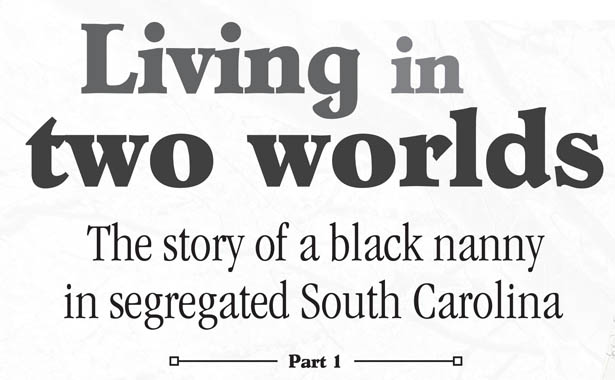
The story of a black nanny
in segregated South Carolina
—– Part 1—–
By Dr. Thomas Cloer, Jr.
Special to The Courier
To celebrate Black History Month, I would highly recommend “Hush Now, Baby,” by a 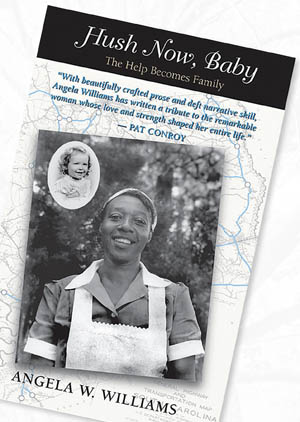
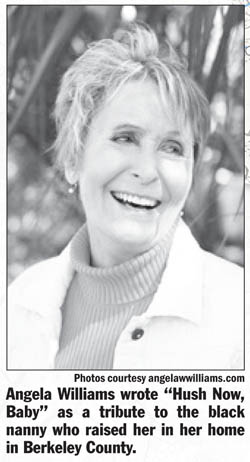 wonderful South Carolina writer, Angela Williams. This book is a read I’ve been wanting to undertake for a while.
wonderful South Carolina writer, Angela Williams. This book is a read I’ve been wanting to undertake for a while.
Angela Williams is an educator and writer close to my age in her 70s. She taught English at the Citadel for 20 years, and I was on Citadel’s campus several times when she was there. I had a colleague at the Citadel who invited me to be a speaker there on different occasions. My wife and I were treated royally as we lodged and took our meals in the Officers’ Quarters.
Angela is from a rich family in Berkeley County. The Williams family held vast amounts of
You must be logged in to view this content.
Subscribe Today or Login
Kimberly Hampton’s mother talks about daughter’s legacy

By Jason Evans
Staff Reporter
jevans@thepccourier.com
EASLEY — Ann Hampton did not know what a Gold Star Mother was until she became one.
 “Back in World War I, mothers started hanging gold stars in their windows when they lost a child in the military,” she said. “There were a lot of gold stars hanging then.”
“Back in World War I, mothers started hanging gold stars in their windows when they lost a child in the military,” she said. “There were a lot of gold stars hanging then.”
In 1928, the official American Gold Star Mothers organization started.
“The mission was to support grieving families, provide services to wounded soldiers,” Hampton said.
The Gold Star Mothers have “a mutual bond,” she said.
“We don’t want anyone else to join,” Hampton said. “We don’t want to be a member, but unfortunately we are.
The mothers “stand tall,” she said.
“We honor our children,” Hampton said. “We honor their sacrifice.”
Hampton spoke last week at the Easley Friends of the Library’s annual meeting, held at the Capt. Kimberly
You must be logged in to view this content.
Subscribe Today or Login
Eastatoee Valley historical marker unveiled in Sunset
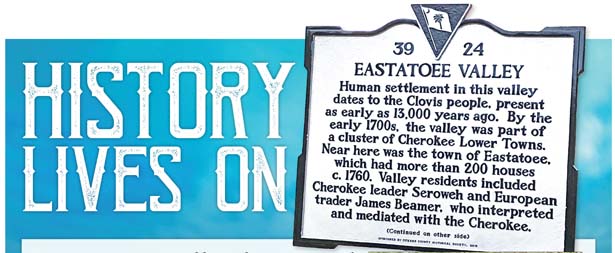
By Jason Evans
Staff Reporter
jevans@thepccourier.com
SUNSET — The Pickens County Historical Society unveiled the county’s newest historical
 marker, one that celebrates the Eastatoee Valley and the people who have dwelt in the area for thousands of years.
marker, one that celebrates the Eastatoee Valley and the people who have dwelt in the area for thousands of years.
“This marker is extraordinarily significant,” PCHS senior vice oresident Wayne Kelley said at the start of the unveiling Wednesday morning.
The marker is located on Cleo Chapman Highway at Shooting Tree Ridge Road.
PCHS Blue Wall vice president Dennis Chastain said the society has been working on the
You must be logged in to view this content.
Subscribe Today or Login
WHY WE CELEBRATE

The Martin Luther King, Jr. Holiday celebrates the life and legacy of a man who brought hope and healing to America. We commemorate as well the timeless values he taught us through his 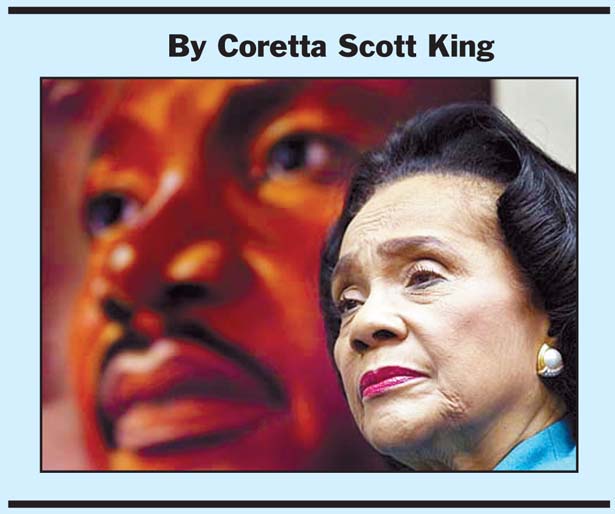 example — the values of courage, truth, justice, compassion, dignity, humility and service that so radiantly defined Dr. King’s character and empowered his leadership. On this holiday, we commemorate the universal, unconditional love, forgiveness and nonviolence that empowered his revolutionary spirit.
example — the values of courage, truth, justice, compassion, dignity, humility and service that so radiantly defined Dr. King’s character and empowered his leadership. On this holiday, we commemorate the universal, unconditional love, forgiveness and nonviolence that empowered his revolutionary spirit.
We commemorate Dr. King’s inspiring words, because his voice and his vision filled a great void in our nation, and answered our collective longing to become a country that truly lived by its noblest principles. Yet, Dr. King knew that it wasn’t enough just to talk the talk, that he had to walk the walk for his words to be credible. And so we commemorate on this holiday the man of action, who put his life on the line for freedom and justice every day, the man who braved threats and jail and beatings and
You must be logged in to view this content.
Subscribe Today or Login
REMEMBERING DR. KING
Each January, Americans remember and reflect on the life of a man who stood up for his rights 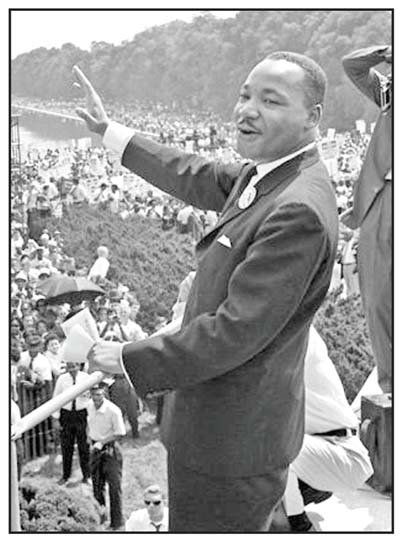 and the rights of millions of American citizens. Martin Luther King Jr. ultimately lost his life fighting for the rights of black Americans, and his courage is celebrated every year on Martin Luther King Jr. Day.
and the rights of millions of American citizens. Martin Luther King Jr. ultimately lost his life fighting for the rights of black Americans, and his courage is celebrated every year on Martin Luther King Jr. Day.
King was a Baptist minister and a social rights activist who helped shape the American Civil Rights movement in the 1950s and 1960s. King seemed destined for greatness at an early age and studied medicine and law at Morehouse College. However, he chose to follow in his father’s footsteps and make a career out of his beliefs and religion. According to History.com, King entered Crozer Theological Seminary in Pennsylvania, where he earned a Bachelor of Divinity degree, won a prestigious fellowship
You must be logged in to view this content.
Subscribe Today or Login
Honoring our fallen heroes
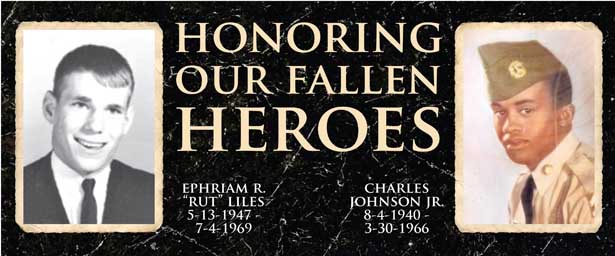
Community honors local soldiers killed in Vietnam War
By Perry Gravely
For The Courier
news@thepccourier.com
PICKENS — Local soldiers killed in the Vietnam War are still being honored throughout the community more than 50 years after their deaths.
According to the Pickens County War Memorial at the Courthouse, 33 soldiers from Pickens County were killed in Vietnam. Their friends and families continue to honor these heroes who made the ultimate sacrifice for their country, including community memorial services held recently for two Pickens natives — Ephriam Rutledge “Rut” Liles II and Charles Johnson Jr.
Ephriam Rutledge ‘Rut’ Liles II
At a recent ceremony for the dedication of a memorial garden, members of the Pickens community stood at rapt  attention while Boy Scouts from Troop 51 saluted the American flag as it was lowered to half-mast to the sound of a fiddle rendering taps from its strings in honor of Liles. A sizeable crowd had gathered to celebrate the life of a native son of Pickens whom friends and family called “Rut” and the dedication of a memorial garden at the Troop 51 Scout Hut where Rut was an Eagle Scout.
attention while Boy Scouts from Troop 51 saluted the American flag as it was lowered to half-mast to the sound of a fiddle rendering taps from its strings in honor of Liles. A sizeable crowd had gathered to celebrate the life of a native son of Pickens whom friends and family called “Rut” and the dedication of a memorial garden at the Troop 51 Scout Hut where Rut was an Eagle Scout.
Rut, who was known for his wonderful smile, made a major impact until his life was cut short when his helicopter was shot down during a reconnaissance mission in the Phuoc Long Province of South Vietnam on July 4, 1969. Several of his old friends spoke at the dedication ceremony and described Rut as an “all-American boy,” a true American hero and the embodiment of a Boy Scout Law. These friends still gather each year to celebrate his birthday more than 50 years after his death.
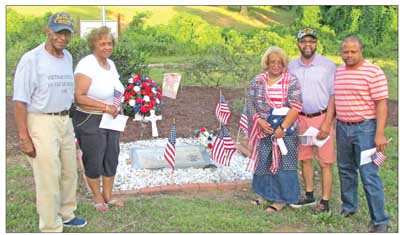
Rut was born in Pickens on May 13, 1947, to Rut and Mary Liles. His sister, Mary Liles Gravely, still remembers the many football games played in their front yard on Glassy Mountain Street and Rut’s passion for the outdoors and sports. At Pickens High School, he played football among other sports and was an active member of Boy Scout Troop
You must be logged in to view this content.
Subscribe Today or Login
The evolution and many faces of Christmas

Many people prepare for the arrival of Christmas months in advance. The first traces of wrapping paper and decorations arrive in stores as early as September, transforming the holiday into a much more secular celebration than its modest Christian beginnings.
Despite Christmas being an important date in the lives of today’s Christians, the holiday failed to gain prominent status until relatively recently. Research indicates that as late as the 19th century, Christmas was not even a legal holiday requiring a day off from work. That’s why 19th century readers of the classic Christmas tale, “A Christmas Carol,” were not shocked at Bob Cratchit having to work on Christmas Day. The United States
You must be logged in to view this content.
Subscribe Today or Login
Tidbits to put you in the holiday spirit
The holiday season has arrived, and millions of people across the globe will be celebrating Christmas with their families and friends. The following are some interesting tidbits to share with your loved ones this holiday season.
• Each year, more than three billion Christmas cards are sent in the United States alone.
• In 350 AD, Pope Julius I, bishop of Rome, proclaimed December 25 the official celebration date for the birth of
You must be logged in to view this content.
Subscribe Today or Login
Yes Virginia there is a Santa Claus
In 1897, Manhattan 8-year-old Virginia O’Hanlon wrote a letter to The Sun, a prominent New York City newspaper, asking a question that was on the minds of curious youngsters of her day, just as it continues to be today: “Is there a Santa Claus?”
One of the paper’s editors, Francis Pharcellus Church, took the opportunity to craft an eloquent and moving response that still inspires hope and faith more than a century later. The editorial — originally printed in the Sept. 21, 1897 edition of The Sun — is known as the most reprinted editorial ever to run in any English-language newspaper. It appears in its entirety below.
We take pleasure in answering at once and thus prominently the communication below, expressing at the same time our great gratification that its faithful author is numbered among the friends of The Sun:
time our great gratification that its faithful author is numbered among the friends of The Sun:
“Dear Editor—
“I am 8 years old. Some of my little friends say there is no Santa Claus. Papa says, ‘If you see it in The Sun, it’s so.’ Please tell me the truth, is there a Santa Claus?
“Virginia O’Hanlon
“115 West Ninety Fifth Street”
Virginia, your little friends are wrong. They have been affected by the skepticism of a skeptical age. They do not believe except they see. They think
You must be logged in to view this content.
Subscribe Today or Login





































